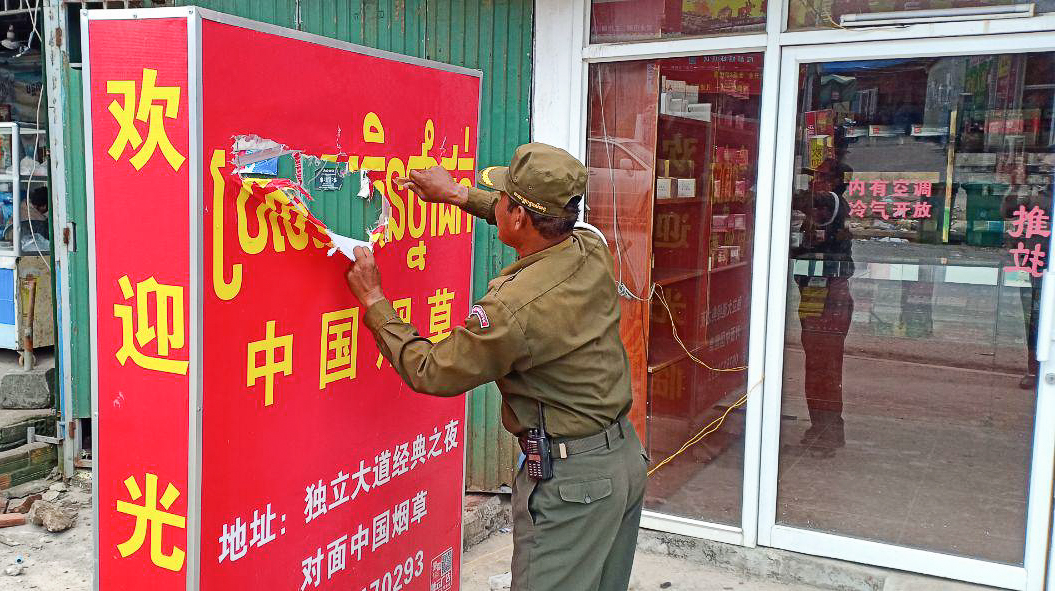
In Sihanoukville at least 391 banners with spelling errors, including the ones showing the Chinese letters bigger than Khmer, have been removed by the authorities so far this year. Photo supplied
Shop banners displaying bad Khmer translations can still be commonly found in Preah Sihanouk province, thanks to Google Translate.
In Sihanoukville alone, at least 391 banners with spelling errors, including the ones showing the Chinese letters bigger than Khmer, have been removed by the authorities so far this year, Lim Pheaktrey, the municipal administration official in charge of public administration and environment, told The Post on Monday.
Misspelt signboards at two separate locations were taken down in the past week alone by the provincial administration, which said the spelling errors were caused by literal translations to Khmer using Google Translate as a result from a lack of understanding in Khmer literature.
“They do not know Khmer and they did not ask for legal permission. This has led to the spelling errors because if they come and ask for permission, they will be required to use the Khmer language and the spelling will also be checked,” Pheaktrey said.
He noted that there was an official in charge of verifying the correct standard and format of shop banners in his administration.
He also acknowledged that the authorities sometimes faced challenges when addressing this issue.
“When we visit [shops] to remove a banner, so much time is often wasted because most of the time we do not meet the owners and have wait until they arrive. And sometimes, we have to make multiple visits just to ask them to remove the signs."
“Language barrier makes matters even worse, especially since most of our officials are unable to speak Chinese. It makes explaining to and instructing the shop owners more difficult,” he said.
Regarding the recent crackdown, Pheaktrey said the municipal administration had instructed the shop owners to pull down their literally inaccurate banners within a week after the initial visit.
“If they don’t follow [the order], the authority could suspend their business operating licence.”

However, Pheaktrey said he is aware that the issue couldn’t be solved completely, given that newcomers would often repeat the same mistakes.
“As long as new businesses keep starting in Cambodia, the mistranslation problem would remain. But we could create a strategy to stop it,” he said, adding that Cambodia has no regulations that cover business signs and logos.
“We hope there will be a new bill to address this issue, so offenders could be held accountable,” he said.
Pheaktrey said the Minister of Tourism has, in the past, instructed his subordinates at the provincial tourism department to work with other relevant authorities to solve the problem of bad Khmer translations on shop banners.
Cheap Sotheary, the provincial coordinator for human rights group Adhoc, told The Post on Monday that this issue could not be completely addressed as long as the provincial administration permits foreigners to operate printing houses without the assistance of Khmer employees.
“When the Chinese businesspeople run a printing shop, they tended to hire services provided by their own nationals,” she said.
She continued that without a Cambodian staff member, the Chinese owners of printing houses would use Google Translate and a keyboard that is not equipped with Khmer font, resulting in the occurrence of spelling errors.











